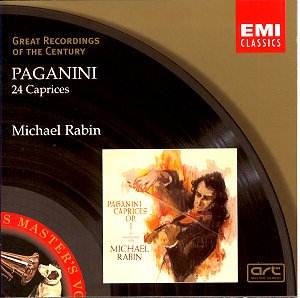The included biography of Michael Rabin paints
a picture of a troubled virtuoso who met a tragic early end. Paganini
himself has been variously described as a neurotic, ill, and troubled
man, so perhaps there is a logic in this pairing of music and
performer. Rabin certainly has all the notes and plays them dead
on pitch and dead on time with stunning assuranceónay, jaw dropping
virtuosityóbut whether there is any music here remains open to
question. Personally I prefer Ruggiero Ricciís performance on
Decca even though it is demonstrably less perfect technically.
It is a fact that Paganiniís live performances overwhelmed so
many great musicians of the nineteenth
century, most notably Liszt, but also including DvořŠk ó
listen to his first symphony and Paganiniís 23rd caprice.
But if this is really great music, why donít
pianists play arrangements of it on the keyboard, which would
be relatively easy for them to do? Separated from the difficulty
of performance does the music simply disappear? Or is it that
the performerís enormous struggle and grateful victory lend an
inappropriate context to what are at heart simple tunes and dances?
The pianists who have transcribed this music concentrate on only
one or two of the works, and then go on to produce an extremely
elaborate composition which is in itself a comment on keyboard
virtuosity, more a reply to Paganiniís challenge than a tribute
to any outpouring of his lyrical soul.
Charles Rosen has commented brilliantly on the
athletic aspect of music, where the performer feels the music
without necessarily hearing it, where the motions of playing become
almost a dance experience apart from the sound produced. Jeffrey
Tate has commented that many performers do not hear their performances,
but learn them and remember them by how they feel while performing
(and hence canít change them even slightly without completely
relearning them). Which is to say that virtuosity without musical
soul is no less valid a human experience, but perhaps not at heart
a truly musical one.
Violin students will want this disk as a document
of what is possible on the violin, and certainly a good hint as
to how the master himself must have sounded when playing.
Paul Shoemaker
Tony
Haywood has a quite different view of this disc
